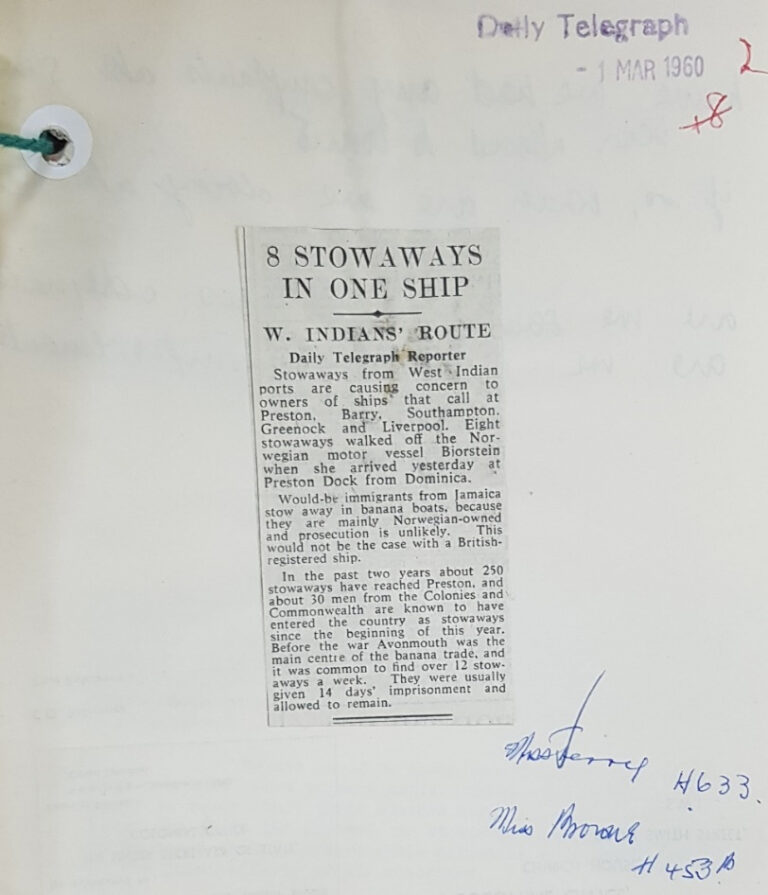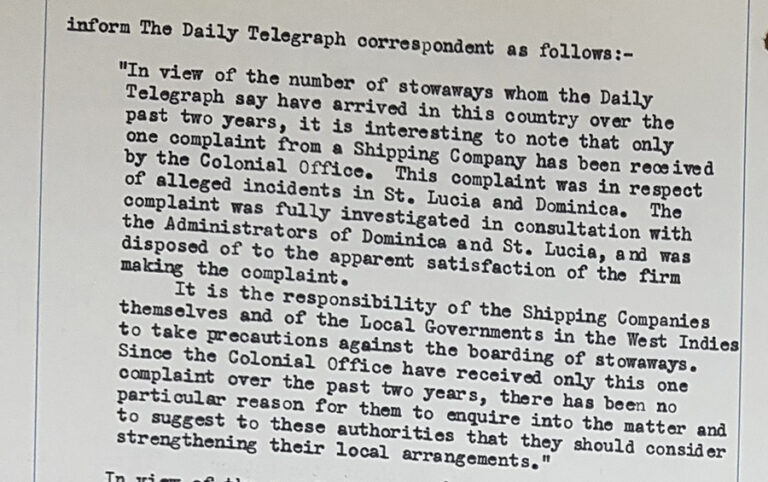February 26th 1960 was a seemingly innocuous day in the annals of British colonial history. A file held at The National Archives demonstrates all was not as it seemed (see footnote 1). All was quiet in the Colonial Office until Mr Roberts received a telephone call from an extremely irate representative from Kaye Son & Co. Ltd, shipping agents for Belgian Fruit Lines. One of the company’s banana boats arrived at Barry Wales, with a consignment of bananas and a complement of Dominican stowaways. Their presence and, more particularly, private letters in the possession of two of the illicit passengers ensured the shipping agent Mr Marchant was literally beside himself with rage and indignation.

Unfortunately, he did not get to speak to the appropriate civil servant, Miss Terry, who after two failed attempts at returning Mr Marchant’s calls was informed by his secretary he would not be returning to his office until Thursday 1 March (footnote 2). On that very day an article appeared on the front page of the Daily Telegraph detailing how eight stowaways disembarked from a Norwegian banana boat at Preston after sailing from Dominica. This article further alleged that 250 stowaways had made the journey to Preston, Lancashire since 1958, with at least 30 arriving since the beginning of 1960. Colonial Office officials suspected that Mr Marchant inspired this article.

Having first complained about stowaways on Belgian Fruit Line ships in November 1959, it is quite clear this article in the Daily Telegraph signified a lack of trust in the British government to adequately remedy the situation at hand. Stowaways were an expensive drain on the shipping company’s finances, for which they received no recompense. The newspaper article can be seen as a shot across the government’s bow. This blog post will examine their response.
A Daily Telegraph reporter contacted Mr Dewen, the Colonial Office’s press officer, with four succinct but equally leading questions.
- Did the Colonial Office receive any complaints concerning stowaways being allowed to board British-bound ships in the West Indies?
- If so, what action was taken to curtail this activity?
- Was the Colonial Office satisfied that any steps taken in the West Indies preventing stowaways were adequate?
- If not, was the Colonial Office making any improvements in these precautions?
In light of these questions and the article that preceded them, a small but thorough investigative trawl through official files was conducted. Apart from a complaint from Mr Marchant in November 1959, which was concluded to his satisfaction, there was no other charge on file to answer for. This outcome was further reiterated in a press statement.

This release stated that, while the Daily Telegraph claimed that a high number of stowaways arrived in Britain since 1958, only one complaint was received regarding this illegal activity. This grievance was about alleged incidents in Dominica and St Lucia. It was fully investigated in conjunction with the administrations in both islands. It was also disposed of in a manner favourable to Kaye Son & Co. Ltd., who had originally brought this matter to light.
The Colonial Office, however, held the view that it was the responsibility of ship owners and local governments in the West Indies to take the relevant precautions needed to stem the flow of stowaways from their respective islands to Britain.
Moreover, as they had only received one complaint over two years, the Colonial Office did not feel it was within their purview to instruct or enquire about the measures these authorities had taken to strengthen their security against what was deemed a local problem.
The authorities in London were more concerned about further repercussions on this matter, therefore it was felt to be prudent to place their views on public record.
With a view of keeping a record of further incidents should they occur, Miss Terry contacted Mr Marchant’s office to impress upon him the importance of writing to her in the future. Although a record of the telephone conversation between him and the Colonial Office was kept, further investigations would not take place unless any complaints were made in writing. Mr Dewen, in turn, wrote a note to Miss Terry thanking her for the form of words used for the press release.

This note was written in a self-congratulatory vein. Mr Dewen’s gratitude for Miss Terry’s assistance notes that the form of words combined with ‘off the record and not for publication guidance’, deterred the Daily Telegraph from reiterating the charge of tardiness among the colonial police force. This was the basis of a complaint made by Kaye Son & Co. Ltd the previous November. This note was dated 2 March 1960. The following day an article entitled ‘Increase in Stowaways from the West Indies’ appeared in the Daily Telegraph (footnote 3).
Inspired by Mr Marchant’s complaints and lack of trust in the Colonial Office to adequately remedy the situation of banana boat stowaways from Dominica, this article was scathing in the criticism it levelled at the British authorities.
It called for stricter measures to be taken to prevent stowaways. It stated shipping companies believed that the leniency given to stowaways only encouraged this illegal act. This article highlighted how the authorities in both Britain and the West Indies were not overly concerned about this problem. Evidence of would-be stowaways being assisted by dockworkers in their quest was also presented. Documents from the Belgian Fruit Lines company are also featured in the article.
The complaint this article was centred on related to the prevalence of the increasing number of stowaways on banana boats sailing between Dominica and Great Britain. The company operating this service suggested more diligent police cooperation was required. They also provided some clues regarding the reason why people stowed away.
According to the Daily Telegraph, Britain was regarded as a paradise. The evidence for this claim was found in letters written to Dominicans from friends in Preston who were successful in their banana boat stowing endeavours. This correspondence contains a wealth of information that can enhance the historical knowledge surrounding this overlooked aspect of history. However, only sensational aspects of their content were published.
Footnotes
- ‘Stowaways onboard banana boats from the Windward Islands’. Catalogue ref: CO 1031/4083.
- Daily Telegraph and Morning Post, 8 stowaways in one ship, 1 March 1960.
- Daily Telegraph and Morning Post, ‘Increase in Stowaways From West Indies’, 3 March 1960.